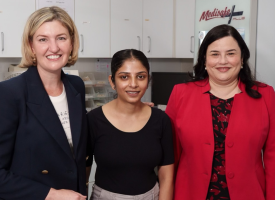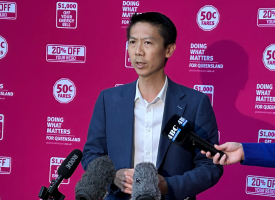Funding reform needed to fix regional surgical services
Fundamental reform of how hospitals are run and funded is urgently needed to fix inequitable access to surgical services in our regional communities, the AMA Queensland Surgical Wait List Roundtable has found.

Releasing the Roundtable’s Action Plan, Roundtable chair and AMA Queensland Vice President Dr Emilia Dauway said the Action Plan provides a ready-made road map for the party that wins the October election and urged Labor and the LNP to commit to its implementation.
“We know patients in regional and rural communities have been suffering from inequitable access to elective surgery for too long,” Dr Dauway said.
“Patients in places like Rockhampton, Mackay, Hervey Bay and even outer-metropolitan hospitals like Caboolture, Logan and Ipswich are waiting long periods to get the surgeries they need.
“This can be particularly lengthy for those needing gynaecology, orthopaedic, urology and ENT procedures.
“Tragically, patients also have their surgeries delayed or cancelled because we just don’t have enough anaesthetists. You simply can’t do surgery without them.
“Doctors are increasingly distressed by their patients’ consequent poorer health outcomes and lack of concerted action to save our regional surgical services.
“They are seeing adverse outcomes like increased opioid addiction, worsening chronic disease, longer recovery time, lost work hours and poorer mental health in our regional communities because of this lack of access.
"Unfortunately delays in some surgical procedures for example for urinary incontinence resulting from gynaecological or urological conditions may lead to increased UTIs, chronic skin inflammation and decline in mental health.
“Not getting eye surgery when it’s needed can stop people driving and limit their independence, employment and ability to care for their families.”
AMA Queensland President Dr Nick Yim said Queensland is the most decentralised state and the Activity Based Funding model, which rewards hospitals for the amount of services they provide, only punishes regions where services are already unavailable.
“If a regional hospital does not have surgeons or enough anaesthetists, it can’t provide services. Elective surgery is necessary, planned surgery for serious conditions,” Dr Yim said.
“We must invest in our regional health workforce and shift to collaborative teams.
“The incoming government must support the regional doctors, nurses and other health professionals who provide the foundation for competent, safe and timely surgical services close to home.
“This Action Plan provides simple, clear short-to-medium term and longer-term solutions for restructuring Queensland Health’s governance frameworks and reestablishing key surgical specialties and services.”
Under the Action Plan, operating hours and surgical scheduling would be expanded to deliver all-day lists and seven-day elective surgical lists where workforce permits, and private patients with private billings would be able to be treated in public hospitals.
Doctors from rural and regional areas would be prioritised in specialist trainee selection processes and specialist and subspecialty training in the regions would be increased.
The Action Plan also calls for an overhaul of HHS classifications to better reflect an area’s remoteness and reforms in many areas across funding, outsourcing, care models, employment, training, data, digital technology and broader underlying policy areas.
Queensland Health would be required to provide better financial incentives for metropolitan in-need specialists to move to the regions and create jobs for any of their Queensland Health-employed partners who are willing to relocate.
The AMA Queensland Surgical Wait List Roundtable Action Plan is available here.
Background
- AMA Queensland established its Surgical Wait List Roundtable in April 2024 to identify practical, affordable actions the newly-elected government can take to address inequities in access.
- Senior medical practitioners in the fields of anaesthetics, general surgery, obstetrics and gynaecology, orthopaedics and general practice from across Queensland met remotely from June to September to come up with recommendations.
- The Roundtable was based on the AMA Queensland Ramping Roundtable which was formed in 2021.
Actions
- Queensland Health must restructure its governance frameworks to solve the current crisis in elective surgery in our regional areas. This must prioritise a shift to collaborative teams and fundamental reform of funding models to reflect regionality and remoteness in the Queensland context.
- Prioritise key locations in the short term – Central Queensland, Mackay, Wide Bay and West Moreton HHSs, and Caboolture, Redland, Redcliffe and Logan Hospitals.
- Prioritise key specialties and specialists in the short term – anaesthetics, obstetrics and gynaecology, urology, ENT, orthopaedics, plastics, ophthalmology and vascular. This includes incentives and flexible supports for partners and families willing to relocate to priority locations, particularly where partners are Queensland Health employees.
- Clear the elective surgery backlog in the short term, including increasing outpatient surgical activity to free up theatres for more complex cases and allowing treatment of private patients in public hospitals.
- Medium-term outsourcing reform and options, including linking emergency and elective work, fee-for-service models and public-private partnerships.
- Establish a range of collaborative models tailored to different sized locations and enabling rotation of regional specialists through tertiary centres in addition to city specialists through regional and rural locations.
- Review current funding models that disadvantage regional areas such as Mackay, Rockhampton, Bundaberg and Gladstone and provide an immediate increase in funding for regional centres to reflect their true remoteness.
- Prioritise key locations in the medium-long term with a focus on locations with the longest wait times for specific services and specialties.
- Prioritise key specialties in the medium-long term by enabling specialist trainees to work in private facilities and increased specialist and sub-specialty training in regional Queensland.
- Develop and implement a long-term viability strategy to ensure public hospitals meet community demand.
- Funding reform so service need is not determined on current activity, which disadvantages areas where services are not available.
- Data and digital technology to provide accurate data on outcomes across geographical areas, specialists per capita and waiting lists, particularly the ‘hidden wait list’ – the stage during which patients wait to see a specialist before they can be put on an elective surgery waiting list or access non-surgical treatments.
- Policy reform to ensure alignment with interstate jurisdictions, particularly New South Wales, and improve wellbeing, culture and perceptions of regional practice among health practitioners.



